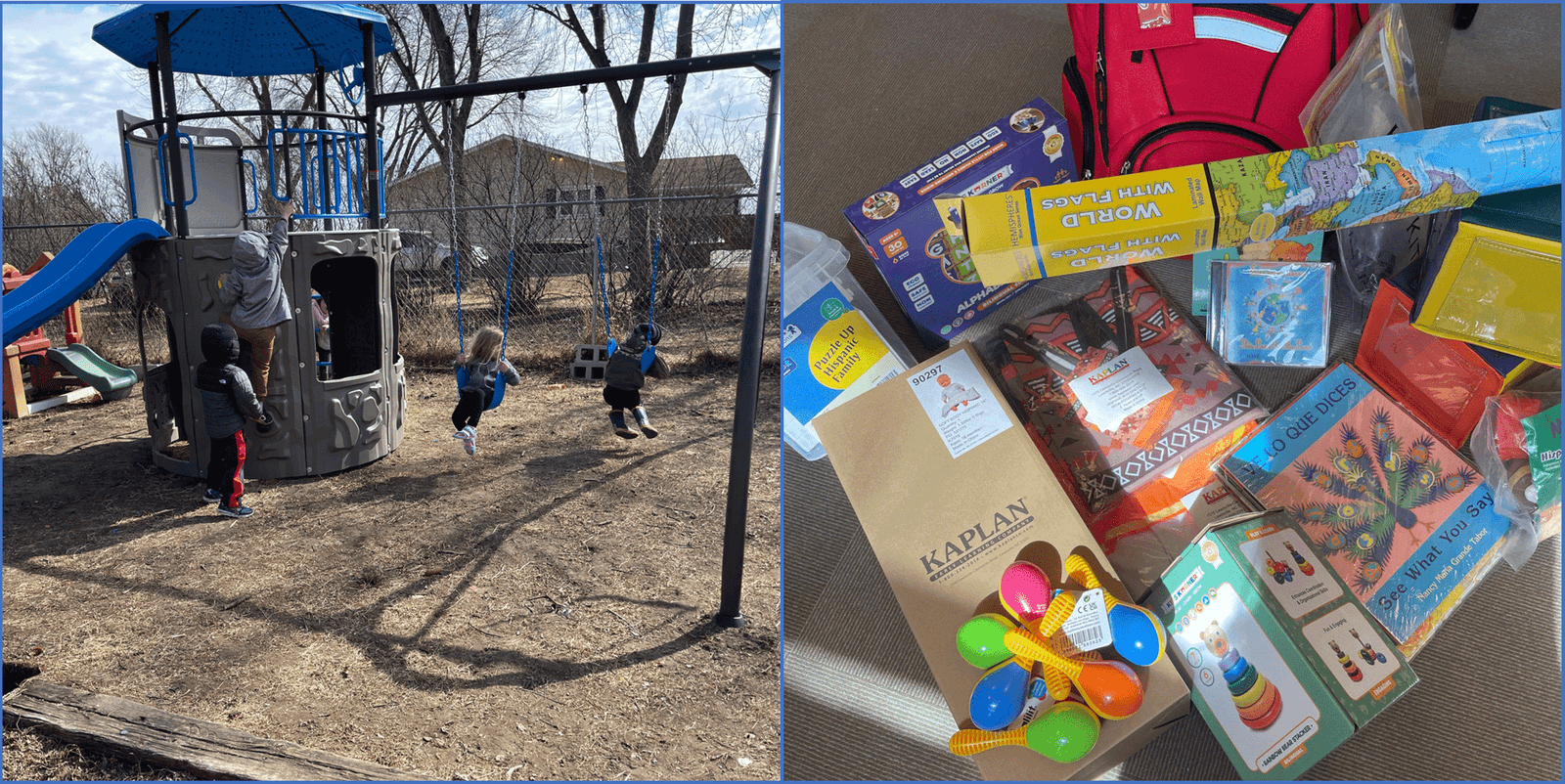
There may be truth to the old adage, “it takes a village,” when it comes to developing quality early childhood care systems. After all, the National Institute for Children’s Health Quality concluded that the coordinated systems needed to impact families’ health needs “require community-based partnerships that can better respond to real needs and build off existing infrastructure.” There is no cookie cutter approach to improving early childhood care and education in individual communities: local systems know their needs and know the gaps that need to be addressed; funding sources and initiatives that are not supported internally are likely to wither; and outside solutions that don’t speak to the unique needs of the community are often seen as band-aids for systemic issues that need more than temporary patches.
Villages, however, often need additional support to fulfill their visions of quality early childhood systems. The Childtrends.org study, “Building our Future: Supporting Community-Based Early Childhood Initiatives” noted in its study of three successful community-state endeavors, “Sustainability requires aligning the effort with broader goals of the community, city, county, region, or state. It also requires building a coalition of leaders, partners, businesses, and families to guide the work and communicate its importance.” Partnerships between community members vested in change and larger organizations that have means and established systems are vital then to creating sustainable early childhood systems that speak to local needs.
Communities for Kids Early Childhood Community Coordinators (ECCCs) have become the bridges between state/regional organizations and communities looking to build thriving early childhood systems. Funded in part by the Preschool Development Grant, ECCCs are embedded in the communities in which they work, know issues the area faces, and often have longstanding connections with the infrastructure of leaders, providers, and families. To speak to them is to understand the investment they have in positive change that lasts, change that helps their communities thrive. As Melissa Polinoski, the ECCC of Holt County said of her vision for local work, “No more band-aids! We need a secure, sustainable childcare infrastructure.” The following profiles demonstrate the commitment these local representatives have to the communities in which they work and how partnership between the state and the local can make the difference toward building high-quality childcare systems.

Sonia Coates
Sonia Coates: Cherry County—Sonia grew up in Valentine, NE, and has worked in the mental health field with the Richard Young Behavioral Health Center, in the foster care system in Child Protective Services, and volunteered as an EMT. She thus has deep roots in her community and broad outreach to service providers, which is why she works not only with early childhood, but all ages birth to death. Her board reflects the local ties she’s nurtured with the mayor, superintendent, a principal, the CEO of the local hospital, two counselors, the Extension Office, and several teachers as sitting members.
Sonia has seen the local early childhood struggle, particularly with the pandemic. She began with 13 in-home providers, which has now dwindled to 8. Because of this drop in capacity and because the local community has no childcare center, she has responded with a plan to turn a gym into a 24-hour care facility and has a provider willing to transfer her work from running in-home care to managing the new center. The project is in its early phases, but cost projections and initial inspections have been completed.
Another major goal she has set in her largely agricultural community is outreach. In order to make connections with families spread out over large areas, she has been able to obtain a 12-foot trailer from Nebraska Children’s Think Make Create Labs, which she has turned into a mobile After School Program equipped with shelves of activities. She also hopes to create a central version of this program in the new Center once it is running.
She has made a connection with a local in-home provider who is acting as a leader in the care community to offer food, cash certificates, and other support during hard times. She has seen a response to this growing sense of community and focus on building a sustainable childcare system with several providers completing step 1 of Step Up to Quality’s certification process. Sonia has hired her former intern to work as a navigator for the SUTQ process and plans to push SUTQ 2.0 when it is released.

Amanda Smith
Amanda Smith: Madison County—Amanda had worked in three childcare settings in the Norfolk area before taking on the position of ECCC. Although she met initial hesitancy from local providers, her attitude was, as she describes it, “I’m here to help you.” She began by building relationships with providers and having conversations about what quality childcare means.
She soon saw the payoff from building community connections when provider enrollment for SUTQ in her area rose from 13 providers to 23. She now works with 2 Parent Interacting with Infant (PIWI) groups, who go through a 9-week session. She also says that there has been increased interest in Early Learning Scholarships for the area, which are designed to close gaps in childcare funding for families who don’t qualify for subsidy.
The region is beginning its second cohort of Rooted ion Relationship training with 9 providers enrolled, and Amanda says she hopes to have 15 providers for the next cohort. She has added to support for area providers by partnering with a local donor to offer “Connie Funds,” which pay for all professional development. The only requirement is that providers must be a part of the once monthly Power to Preschool networking group.
Madison County already offers: the Stuff the Bus program, which “provides new school supplies and book bags to children in Norfolk and surrounding communities at no cost”; a teacher and provider appreciation week; social emotional backpacks for providers; and Maternal Child Health Grants. To add to existing efforts, Amanda is in discussions with local businesses on how they can partner to provide additional funding.
Amanda wants to work more, as she moves forward, with Spanish-speaking providers in her area. She was already a part of the successful bilingual campaign that began under her predecessor, Abbie Gustad, to provide toys and training for work with Spanish-speaking families and she would like to continue that work with providers.

Kathy Moller
Kathy Moller: Dakota County—Kathy began her work in the area with Head Start where she spent 5 years as a teacher before becoming Area Manager. She soon took on a grant for Early Head Start as an Education Specialist and ultimately moved into an Assistant Director position. When she became both the ECCC for Dakota and the Rooted in Relationships Coordinator, she said, “After working with providers, I felt that they really hadn’t had a person they could ask questions.” She thus wanted to build a sense of community so she started a bimonthly support gathering.
As she made connections, she began helping providers apply for the Nebraska Stabilization Grant and worked with in-home providers who wanted to become licensed. She also created an application for Quality and Capacity Building and was able to award funding to 14 area providers who applied out of the 24 in her area.
Kathy’s hard work has paid off. Since the ECCC position started, Step Up to Quality has grown from 1-14 providers. Kathy credits her predecessor’s work and her own in visiting providers and selling the importance of quality and the SUTQ program. Not only is she building supports for existing providers, but she has also been able to offer scholarships to students studying early childhood education as a way of drawing more people into the field.
Kathy is particularly pleased with the work she has been able to do in bilingual communities. She has partnered with the Early Childhood Coordinator at ESU 1 to work closely with 2 South Sioux City locations that are Spanish-speaking providers. She has set up a Spanish CPR and 1st aid training for the area as well as 2 other trainings for 6 in-home and center director providers.
Grants and financial supports have generated lots of positive responses, including from local families. She has 7 families who are receiving Early Learning Scholarships, and she says “lots of people are calling and asking questions.” She hopes to build on these successes by doing more Pyramid Model Training cohorts and by expanding her Rooted in Relationships cohort.

Melissa Polinoski
Melissa Polinoski: Holt County (Atkinson)—Melissa began her work in the community as a public-school teacher. After a hiatus from education where she ran a business from her home, Melissa was approached by a local developer about the ECCC position. She now not only holds that position but is part of a well-being team that works with all ages and systems to identify gaps that need to be addressed. She says one thing that drew her to taking on the role of Coordinator is that she ”had seen kids who, if supports had been available, their outcomes would have been so different.”
The initial plan when she began had been to build a childcare center, but after discussions with the local community, she learned that they preferred in-home childcare. Focus then turned toward how to expand capacity so that sufficient quality care was available. This led to an ambitious plan to build new homes in the community that increase capacity. Residents who agree to run in-home care receive financial incentives for the purchase of the home. Melissa points out that this work addresses a housing crisis in the local area and increases the tax base thus building toward a thriving community.
In her first year as ECCC, she has created a “Pro-Learning Community,” purchased social emotional development planners and curriculum programs, and increased Step Up to Quality enrollment from 0 to 33% of providers. She has also had important conversations with the provider community and learned that a lot of burnout has resulted from capacity issues and that there is a strong need for afterschool, weekend, and holiday childcare. In response she has established a Certified Child Caregiver Class, which offers those interested in childcare training in social and educational development, safety protocols for childcare, and even small business planning. The class is now in its second years and has seen the number of participants double from the first training.
These are just four examples of the remarkable work that can be done when state-level organizations partner with local areas. Communities for Kids is already working within 34 communities/areas of Nebraska, and the Preschool Development Grant is helping fund Early Childhood Community Coordinators to facilitate the important work of building high-quality childcare systems. But PDG funds will eventually end. The challenge the system faces is how to sustain change and support the growing infrastructure of thriving communities.
Sustainability requires commitment at all levels. Policy changes must provide long-term funding to continue the development work that state organizations have begun. Community businesses and leaders need to support the work being done to address gaps in local systems. Providers and parents must make their voices heard so that changemakers in the state keep a quality childcare system as a priority in their work. Without this level of commitment, current changes may only be a Band-Aid, a temporary fix, that disappears when funding dries up.
The evidence is clear: investment in quality childcare that is available to all families who need it has huge impact. Children’s social, emotional, and intellectual development is affected. Families’ ability to earn is affected. Business’s ability to maintain a workforce and prosper is affected. The state’s tax coffers are affected. No more Band-Aids! Let’s make sure that sustainable funding for early childhood stays a priority long after PDG funds are gone, so that engaged community changemakers like the Early Childhood Community Coordinators highlighted here can continue to build the early childhood systems their local communities need to thrive.












